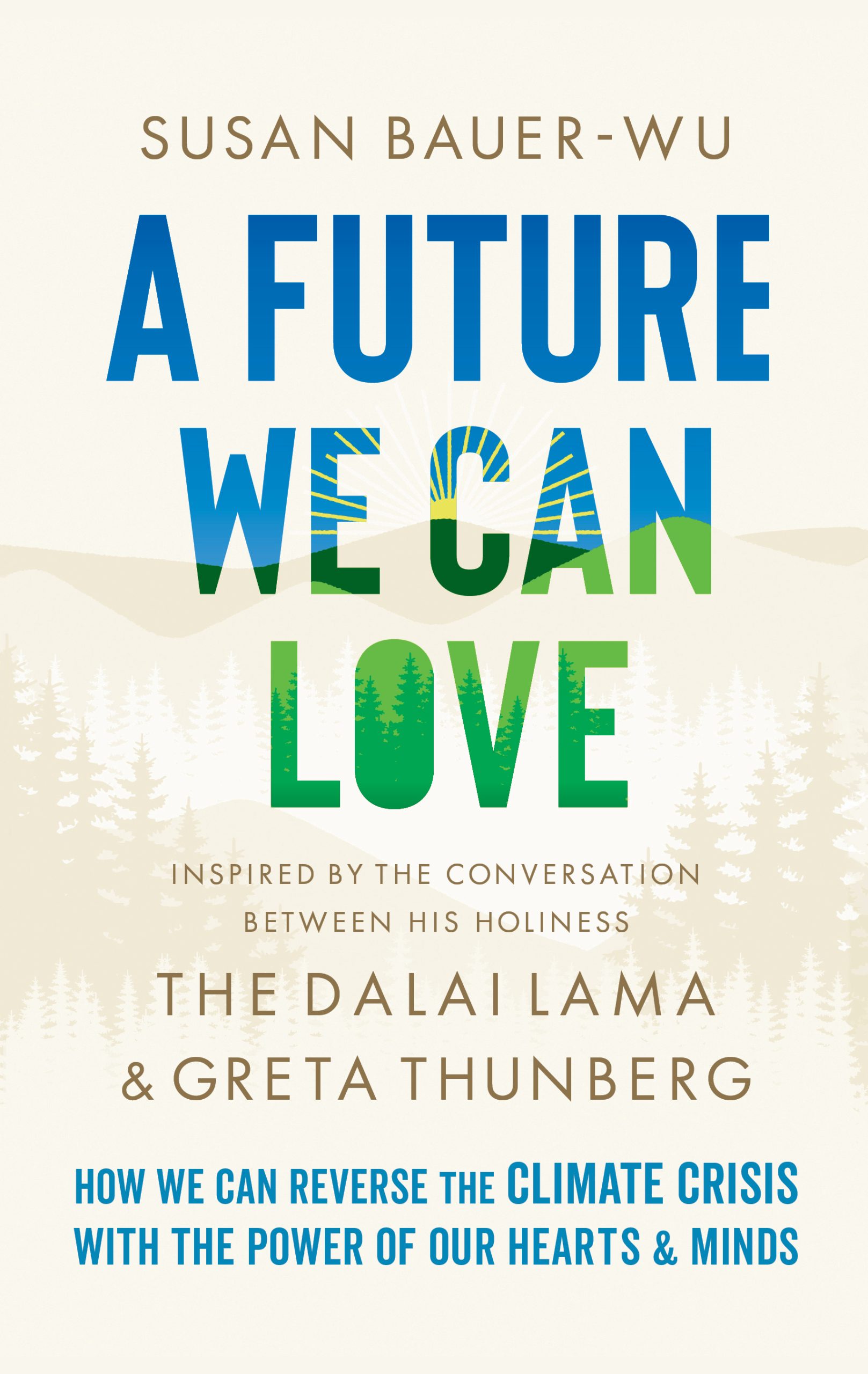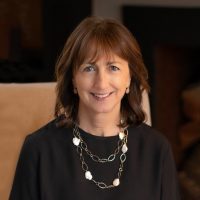
*Excerpt from A Future We Can Love: How We Can Reverse the Climate Crisis with the Power of Our Hearts and Minds by Susan Bauer-Wu © 2023 by the Mind & Life Institute. Reprinted in arrangement with Shambhala Publications, Inc. Boulder, CO. www.shambhala.com
~
From Chapter 5 “Heartbreak: The Darkness and the Light”
Greta says, talking to the Dalai Lama, “We are desperate for a raise in spreading of awareness, and we need to tell people about what’s happening right now.” I’ve heard her call for more awareness many times, but this time the word desperate stands out to me. Whereas phrases like “educating ourselves,” “reading up” on a subject, “facing the facts,” and so forth point to wrestling with the climate crisis in our heads, desperation is a feeling. This matters, because teachability in bottoming-out depends at least as much on the heart as the head, as the word heartbreak suggests. In Joanna Macy’s words, “The heart that breaks creates a space big enough for God to move in.” Sometimes the crack is wide indeed, and it’s going to have to be if it is to hold our grief for life as we know it.
When the British writer and environmental activist George Monbiot saw the movie Don’t Look Up, a meteor-heading- toward-Earth allegory of people’s ostrichlike attitudes about climate change, it reminded him of the time he broke down on a popular morning show in real life, like the actress Jennifer Lawrence’s scientist character in the movie. “It was soon after the COP26 climate conference in Glasgow,” recalls George, “where we had seen the least serious of all governments (the UK was hosting the talks) failing to rise to the most serious of all issues. I tried, for the thousandth time, to explain what we are facing and suddenly couldn’t hold it in any longer. I burst into tears on live TV.” George says he was mortified when it happened and still feels embarrassed. “The response on social media, like the response to the scientist in the film, was vituperative and vicious. I was faking. I was hysterical. I was mentally ill. But knowing where we are and what we face, seeing the indifference of those who wield power, seeing how our existential crisis has been marginalised in favor of trivia and frivolity, I now realize that there would be something wrong with me if I hadn’t lost it.”
Joanna Macy agrees. “You are suffering with your world? That’s the most natural thing in the world,” she says, “the most wholesome, healthy thing in the world, too.” She remembers riding a subway across the Charles River from Boston to Cambridge in 1976, when it first really sunk in. She had attended an all-day symposium on threats to the biosphere. Sitting there on the T looking out at the sailboats in setting sunlight, she remembers thinking, “Yes, we can do it now, we can destroy our world. Hadn’t that knowledge been lurking all along in every sight of streaming smokestacks and clearcut forests? That knowledge came out of hiding now, and I had no idea how to live with it.”
I want to talk about how to live with this knowledge and these feelings. Joanna tells another story, from a couple of years later, when she was asked to lead a weeklong working group at a meeting of the Society for Human Values in Higher Education, as part of a conference at Notre Dame. The first morning, thirty or so participants gathered for introductions. “Because I could not bear to hear people identify themselves by their rank and academic credentials,” she recalls, “I broke with convention and said, ‘Please introduce yourself by sharing an image or an experience of a moment when you felt the planetary crisis impinge on your own life.’” What happened after that was “some kind of magic.” People spoke briefly but plainly of their pain at what they saw happening to the world, their fears for their children, their discouragement. “It came to me like a thunderclap,” she says, the realization that “Oh my God, the suffering can be spoken!” And it wasn’t just her. Speaking their suffering brought the whole group together, “unleashing creative energy and mutual caring. . . . Sessions went overtime, laced with hilarity and punctuated with plans for future projects.” We may be heartbroken and scared, but in daring to talk about it, we realize we’re not alone. Sharing my broken heart and caring about yours, says Joanna, “delivers us to a new kind of humanity.”
The former-climate-journalist-turned-Buddhist-teacher Catherine Ingram describes her own experience coming to terms with the truth of what we’re doing—what we’ve already done—to our planet. The author of an article she titled “Facing Extinction,” she is, as that title suggests, unflinching. “As I began to realize the gravity of our situation, I quickly recognized that my own death was not much of an issue.” Though she doesn’t pretend to have no fear of death, she has already lived a long time and has gone a long way to accepting her mortality. “No,” she says, “the despair came from the thoughts about my young great-nieces and great-nephew with whom I am close. All nine of them were under the age of ten when I began to realize that they are not likely to have long lives.” Catherine’s assessment of the research is very dark, and her outlook could be summed up as sooner than you think. “The anxiety and despair into which I sank was such that I be-came very ill,” she recalls. “I developed a massive case of shingles covering large areas of my torso, front and back in two zones (apparently it is rare to have shingles in more than one zone) and I ended up in the hospital.” Shingles, she says, is a stress-related ill-ness. “My anxiety and despair had made me physically sick. Once home and bedridden for the best part of a month, I had a chance to consider how unaffordable my fear and anxiety would be going forward. I had to find a perspective that would allow me to access at least some quiet underneath the profound sadness, some whisper that says, ‘This is the suchness of things. Everything passes.’”
She acknowledges that, by choice or necessity, people relate to the climate crisis in vastly different ways—for example, hundreds of millions of climate refugees around the world, parents of young children among them, struggling to survive climate change–related catastrophes that have already happened. For them, says Catherine, “any fretting about the future would seem the greatest of luxuries and privileges.” They have been forced to come to terms with it. On the other extreme, she knows that many parents currently in more comfortable circumstances can-not or will not talk about the present and future suffering and destruction of climate change. She has had to accept “that virtually no one in my family and few of my friends are either ready to hear this information now or will be prepared to face what is ahead in time.”
George Monbiot chimes in. “As we race towards Earth system collapse, trying to raise the alarm feels like being trapped behind a thick plate of glass. People can see our mouths opening and closing, but they struggle to hear what we are saying. As we frantically bang the glass, we look ever crazier. And feel it. The situation is genuinely maddening. I’ve been working on these issues since I was 22, and full of confidence and hope. I’m about to turn 59, and the confidence is turning to cold fear, the hope to horror. As manufactured indifference ensures that we remain unheard, it becomes ever harder to know how to hold it together. I cry most days now.”
We talk about the floods and droughts, the fires and the melting ice, evacuations and disaster relief. We talk about degrees Celsius and parts per million. Or at least some of us do. I’m only just learning to. But even fewer of us, I sense, are talking about how we feel about all this. We’re afraid of climate change and perhaps equally afraid to feel how scared we are. We’re furious at government inaction, but we don’t want to be “an angry person.” We feel helpless, and this is so uncomfortable that we don’t think we can stand it. We’re sad yet holding back, wary of drowning in this sadness; it might be bottomless. We don’t want to cry most days. Nonetheless it is my hope—a strange thing to hope for—that this is changing and the time has come to tell each other how the climate crisis feels, how hard this is; not for the sake of wallowing, obviously, or even just for getting through the day (though sometimes just for getting through the day) but for the sake of motivation and transformation. My most honest conversations so far have showed me there’s relief in giving up the charade that everything’s okay and strength to be found in this deeper communion. Maybe we cry, but we don’t have to cry alone. Maybe we crack each other up with some much-needed gallows humor. Maybe we’re not crazy. Maybe it literally makes the difference, for some people, between wanting to kill themselves and wanting to go on living. Maybe, just maybe, we don’t turn on each other as we face scarcity because maybe this crisis brings out the best in us, our capacity for tenderness, caring, and cooperation. Maybe, whatever ends up happening, we come together and take care of one another.
As Joanna says, “This is a birthing time as well as a dying time. It’s going to take this kind of anguish to birth a new humanity, a new solidarity.”
~
Please consider Boosting our authors’ articles in their first week to help them win Elephant’s Ecosystem so they can get paid and write more.











Read 2 comments and reply